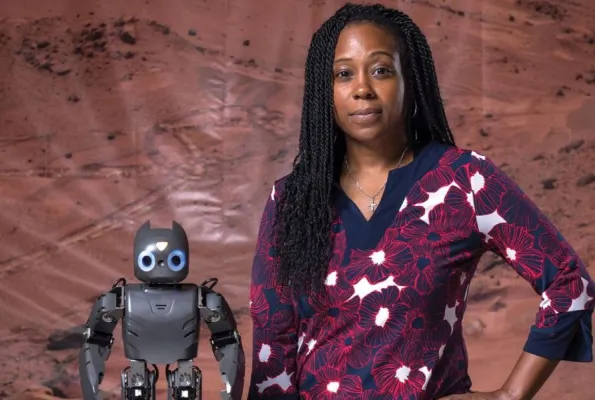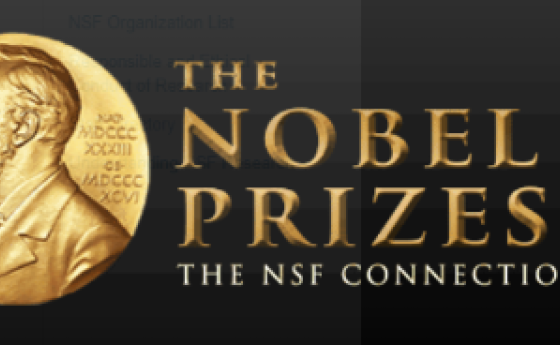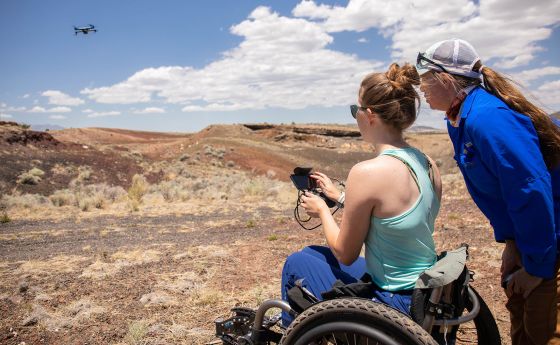
#NSFstories: Breaking boundaries and escaping boxes
When she was young, Ayanna Howard was encouraged to be fearless. The firstborn of an engineer, Ayanna’s father taught her to solder electronics by the age of 10.
“I burned my fingers and took things apart,” Ayanna recalls. “I climbed trees in a dress.”
She was breaking boundaries even before knowing there were any to break.
Tenacious and determined, Ayanna didn’t shy away from difficult problems either. In fact, she welcomed them.
It wasn’t long before she turned her love for tackling challenges into a distinguished career as an electrical engineer and researcher. As the Linda J. and Mark C. Smith Professor and Chair of the School of Interactive Computing at Georgia Tech, Ayanna has become one of the foremost experts in robotics, computer vision and artificial intelligence.
But it was a research grant from the National Science Foundation that led her in a new direction – exploring the use of robots for therapeutic rehabilitation.
While leading a robotics camp at a local hospital as part of her NSF grant, Ayanna served a group of children with traumatic brain injury. The experience provided a watershed moment.
“It opened my eyes. We had these beautiful robots, but nobody at that hospital could use any of them. So, I started asking questions.”
Stepping outside the academic box
Ayanna’s questions led her to pursue a new area of research, exploring assistive robotic technology for children with differing abilities. In 2013, that research became the basis of Zyrobotics, LLC, a company providing early STEM education technologies for diverse learners.
Zyrobotics empowers all students aged three through six with the freedom to be and do anything, a mission powerfully captured by its tagline: “Freedom Through Technology.” As founder and chief technology officer of the company, Ayanna knew from her research that early STEM education exposes learners to challenging concepts and problem-solving opportunities when they are their most fearless. And that exposure builds life-long confidence for tackling challenges of any kind.
“At this age, they’re not afraid to fail,” she says. “They’re still curious, and they want to be creative. It’s a perfect learning environment.”
It is also an environment perfect for high-risk research, which Ayanna says is a pathway to solving society’s toughest problems.
NSF’s long-term investments in fundamental science and engineering enable researchers like Ayanna to remain their most curious, providing them support to think outside the box and to untangle difficult problems that demand time and repeated effort.
“NSF is one place that’s left where it’s understood that it may take 10 or more years,” she says. “But after several efforts, guess what … we find a cure for cancer or we make education accessible.”
For an academic looking to become an entrepreneur and launch a company, some boxes are hard to escape, even for those already groomed to be risk-takers. Fortunately for Ayanna, NSF’s Innovation Corps program, or I-Corps, helped her explore the possibility of developing a start-up.
Joining the Corps
NSF’s I-Corps teaches students and faculty how to test the commercial potential of a research idea. Since its inception in 2011, I-Corps has trained more than 1,300 teams, including nearly 4,000 participants. Following the program training, I-Corps teams have gone on to raise more than $300 million in startup capital in follow-on funding.
I-Corps challenges researchers to get out of the university lab and into the marketplace – a shift in perspective that has had a profound impact on Ayanna to this day.
“We start participant-testing before the technology is even finished,” she explains. “I-Corps has even reframed how I approach research, in general. I often ask my students, ‘Who cares about this? Whoever it is, it can’t just be you.’”
In the case of Zyrobotics, it was the parent of a severely disabled child, who cared enough to write a heartfelt email thanking Ayanna after her son lit up for the first time while interacting with a Zyrobotics product called Fire Fighter.
Ayanna explains that Zyrobotics helps children fall in love with STEM through AI-powered robots like the Zumo Turtle or Tommy the Robot. They offer games and apps designed to help children learn how to code as well as interactive children’s books focused on science and math. The company is also working on a new Bluetooth interface that will make tablets accessible to children of all abilities.
Today, Zyrobotic’s products are used in clinics, schools and homes across the country, allowing Ayanna, who remains an active researcher and adventurer, to continue her work inspiring freedom and fearlessness in every child.



